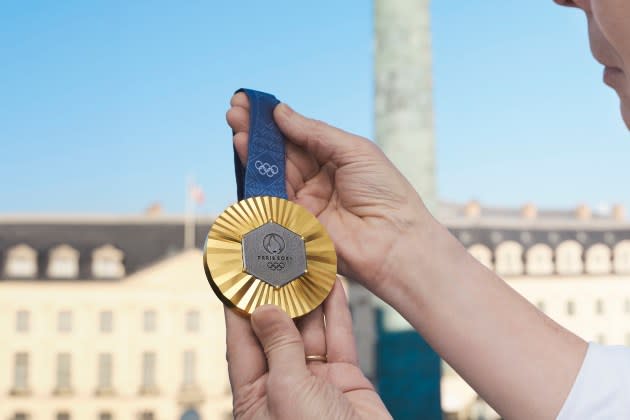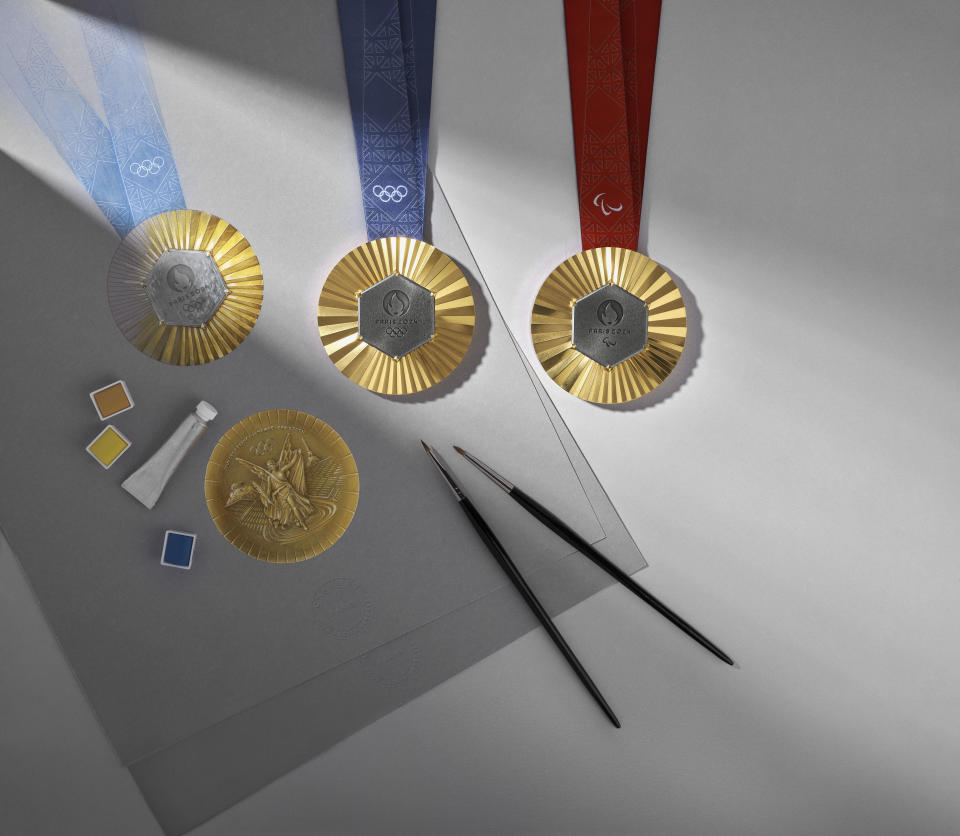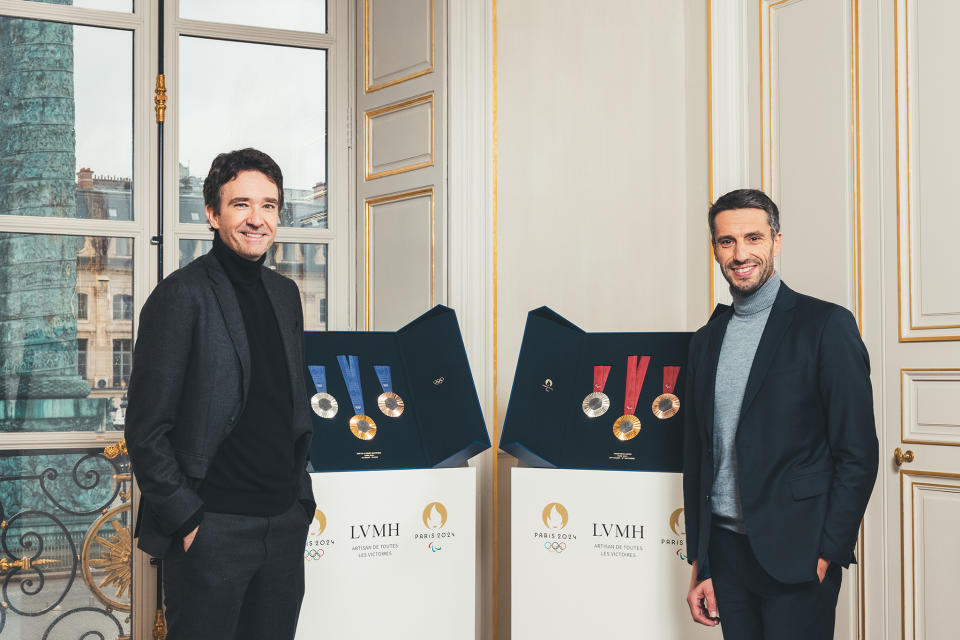Chaumet Unveils Olympic and Paralympic Medals Set With Eiffel Tower Piece

PARIS — Come July, victorious athletes at the 2024 Summer Olympic Games won’t just be taking home a medal: they’ll be taking home a piece of the Eiffel Tower, too.
It is the centerpiece of the medals unveiled Thursday, designed by Chaumet in conjunction with the French Paralympic and Sports Committee.
More from WWD
New Yves Saint Laurent Exhibit Shows How He Created 'Sheer' Trend
EXCLUSIVE: Dior Signs Skateboarder Aurélien Giraud as Brand Ambassador
“To ensure these medals would truly bear the signature of Paris 2024, we married the strongest symbol of the Games, the medal, with the absolute signifier of Paris and France in the entire world, the Eiffel Tower,” said Tony Estanguet, president of Paris 2024.
At the suggestion of the Athletes’ Committee, embedding a piece of the Parisian monument became part of the brief given to Chaumet, the first-ever jewelry house commissioned to design Olympic medals.
Their presentation marks “the first tangible achievement” of the partnership between the Paris 2024 Olympic and Paralympic Games and the jeweler’s parent LVMH Moët Hennessy Louis Vuitton, said the luxury group’s head of communication, image and environment Antoine Arnault.
The reverse side of each of the 5,084 Olympic and Paralympic medals due to be awarded is therefore set with an 18-gram hexagonal plaque made of iron used for the Eiffel Tower in 1889 and collected during its renovation.
It is surrounded by faceted rays, nodding to Paris’ moniker of “Ville Lumière” and symbolically highlighting the athlete. Along the edges is engraved the discipline of each award.
On Olympic medals, the obverse face figures Athena as the goddess of victory and Greece’s Parthenon as a representation of the modern-era renaissance of the antique competition, a shared feature of all Games.
Sole concession to the host country’s enduring connection to the Games: the iconic Parisian landmark silhouetted on the horizon.
For Paralympians, Chaumet was given carte blanche and chose to represent the Eiffel Tower as seen from underneath, adding the inscription “Paris 2024” in universal braille in a nod to its inventor — Frenchman Louis Braille.
Worked as jewels, both sides “will show the most beautiful face of France,” said Estanguet. “With their piece of [the tower], they will be totally unique pieces that will create a genuine link between medaled athletes and our country.”
According to Arnault, it felt logical to call on a house specialized in special orders and unique pieces for “the ultimate object of desire, something everyone will want, wish, see and touch.”
And like any high jewelry collection or bespoke order, the work of Chaumet design studio head Clémentine Massonnat started in the house archives. With 244 years of existence, there was plenty to look at.

Exhibit A: an order book that revealed Gustave Eiffel was a client of the Place Vendôme jeweler. “It really created a resonance between the house, the Games and a sense of history continuated,” she said.
Among the ideas that Massonnat and the Chaumet studio alighted on were hexagon-cut emeralds set amid circular compositions and geometric tiaras with graduated diamond-set segments.
Being inspired by a tiara for a medal might sound odd but “in both cases, you’re crowning something,” she said. Plus, Chaumet also had a little-known expertise in creating commemorative medals in decades long past.
Cinching the Paris 2024 side of the medals was a swift process, according to the design lead. Even the idea of representing the Eiffel Tower from underneath slotted in nicely. “It is a less-used view but it is still very recognizable to anyone who has visited — or been given a figurine,” Massonnat said.
Then came making the medals, a precisely calibrated format. To wit: 8.5 centimeters in diameter, 9.2 millimeters in height, 6 grams of gold for the top gong for a weight around 500 grams — the exact figure depends on the metal composition of each category, explained Chaumet’s 13th workshop head Benoît Verhulle.
If setting one iron gem into a medal is well within the remit of any jeweler worth their salt, producing more than 5,000 of them in the space of a few months called for adaptations.
“What we did is a trompe-l’oeil version of a claw setting,” he revealed. This allowed La Monnaie de Paris, France’s sovereign mint that produced the medals, to press them as it would coinage. Another detail is the way the medals are suspended, the ribbon slipping into a hidden spring bar system inspired by watchmaking.
Estanguet called the medal the “concrete and perfect illustration” of the partnership with LVMH, that will see Berluti dress France’s team for the opening ceremonies and Louis Vuitton, Dior and the Moët Hennessy wines and spirits division also take part. Sephora has been revealed as a partner of the Olympic Torch Relay’s arrival in Marseille on May 8.
There was a frisson of emotion at the unveiling attended by press and athletes including swimmer Béatrice Hess, the most medaled French athlete in the history of the Paralympics, and wheelchair tennis champion Pauline Déroulède.
It was the reaction Arnault was hoping for.
“Behind these medals is time, a thought process, the collective intelligence of the Chaumet artisans, its design studio and the people of Paris 2024,” he said. “Knowing that these Chaumet-designed medals will be disseminated throughout the world is a great pride and great honor for our group and for the house — although I do hope a number of them will be in France.”
Beyond the obvious symbol of sporting spirit and victory the medals carry, Arnault wished they would also serve as a beacon of optimism ahead of the Games.
“We are not too used to viewing things through a positive prism, particularly in France,” said Arnault, expressing confidence in the level of preparedness and professionalism of the French organizers.
Despite reassuring updates from the Paris 2024 Olympic Committee, concerns have been raised by Paris Mayor Anne Hidalgo over infrastructure and by luxury sector representatives worried about months-long disruptions. Local support has also ebbed as questions swirl about security and logistics.
While the luxury executive did expect everyday activities to take a bit more time, “it’s once in a century,” Arnault continued. “We should be proud rather than looking down at our feet and criticizing.”

Best of WWD


